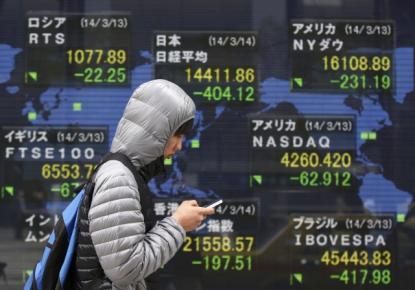Shares under pressure as diplomatic tensions rise on Crimea
Bareksa • 17 Mar 2014

Man walks past an electronic board displaying various countries' stock price indices outside a brokerage in Tokyo (REUTERS/Toru Hanai)
The markets were expecting the Crimean to agree to join Russia
Reuters - Asian shares got off to a shaky start on Monday after citizens of Crimea overwhelmingly voted to break with Ukraine to join Russia, prompting the U.S. and the European Union to issue fresh warnings of imminent sanctions against Moscow.
MSCI's broadest index of Asia-Pacific shares outside Japan was off 0.2 percent in early trade after slumping 2.9 percent last week, its biggest in more than six months.
The tense backdrop pulled U.S. stock futures down 0.5 percent to the lowest in three weeks while Japan's Nikkei was also expected to fall further from a one-month low hit on Friday.
"The markets were expecting the Crimean to agree to join Russia. So that alone is unlikely to move markets. The focus is on what kind of actions Russia and the West will take next," said Tohru Sasaki, the head of Japan rates and FX research at JPMorgan Chase.
More than 90 percent of Crimeans chose the option of annexation by Moscow in a referendum, which Western powers have denounced as a sham.
U.S. President Barack Obama Russian said Washington rejected the results of a referendum, warning that the United States was ready to impose sanctions on Moscow.
Tension between Russia and the West over Ukraine have hit share markets in recent weeks and boosted traditional safe-haven assets.
Gold, which rose 3 percent last week, traded at $1,385.41 per ounce, just under a six-month high of $1,387.90 hit on Friday.
The Japanese yen also traded near the top of its range in the past month and a half, with the dollar fetching 101.41 yen , not far from this year's low around 100.80 yen.
The euro stood at $1.3912, off 2 1/2-year high around $1.3967 reached last Thursday after European Central Bank chief Mario Draghi voiced concerns about the strength of the common currency.
Another big focus in Asia is on the Chinese yuan after Beijing announced on Saturday it is doubling the daily trading range for the yuan, adding teeth to a promise it would allow market forces to play a greater role in the economy and its markets. The move is effective on Monday.
Analysts said the move was a sign of confidence that the central bank had successfully fought off a plague of currency speculators, and at the same time signalled that regulators believe the economy is stable enough to handle more promised financial reforms to freer markets.
In the onshore market, the yuan closed at 6.1502 to the dollar while the offshore yuan in Hong Kong hit a 10-month low of 6.1560 to the dollar on Friday.